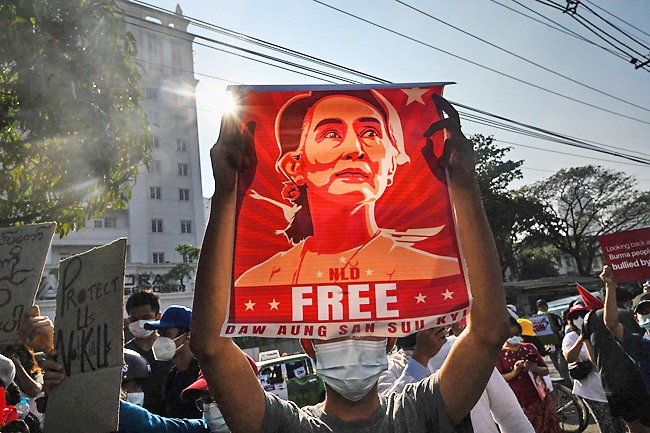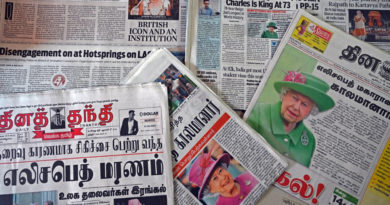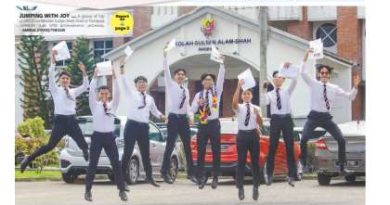HEADLINE: DEMOCRACY-FREEDOM- YANGON Myanmar- Ousted Myanmar leader on trial; critics say charges bogus
File photo shows a protester holding up a poster featuring Aung San Suu Kyi during a demonstration against the military coup in Yangon. PHOTO: AFP
.
.

BANGKOK (AP) — Myanmar’s ousted leader Aung San Suu Kyi went on trial yesterday on charges that many observers have criticised as attempt by the military junta that deposed her to delegitimise her democratic election and cripple her political future.
Suu Kyi’s prosecution poses the greatest challenge for the 75-year-old and her National League for Democracy party since February’s military coup, which prevented them from taking office for a second five-year term following last year’s landslide election victory.
Human Rights Watch charged that the allegations being heard in a special court in the capital, Naypyitaw, are “bogus and politically motivated” with the intention of nullifying the victory and preventing Suu Kyi from running for office again.
“This trial is clearly the opening salvo in an overall strategy to neuter Suu Kyi and the National League for Democracy party as a force that can challenge military rule in the future,” said the organisation’s Asia Deputy Director Phil Robertson.
The army seized power on February 1 before the new lawmakers could be seated, and arrested Suu Kyi, who held the post of special counsellor, and President Win Myint, along with other members of her government and ruling party. The coup reversed years of slow progress toward more democracy for Myanmar.

The army cited the government’s failure to properly investigate alleged voting irregularities as its reason for seizing power — an assertion contested by the independent Asian Network for Free Elections and many others. Junta officials have threatened to dissolve the National League for Democracy for alleged involvement in election fraud and any conviction for Suu Kyi could see her barred from politics.
The junta has claimed it will hold new elections within the next year or two but the country’s military has a long history of promising elections and not following through. The military ruled Myanmar for 50 years after a coup in 1962, and kept Suu Kyi under house arrest for 15 years after a failed 1988 popular uprising.
The military’s latest takeover sparked nationwide protests that continue despite a violent crackdown that has killed hundreds of people. Although street demonstrations have shrunk in number and scale, the junta now faces a low-level armed insurrection by its opponents in both rural and urban areas.
Suu Kyi is being tried on allegations she illegally imported walkie-talkies for her bodyguards’ use, unlicenced use of the radios and spreading information that could cause public alarm or unrest, as well as for two counts of violating the Natural Disaster Management Law for allegedly breaking pandemic restrictions during the 2020 election campaign, her lawyers said on Sunday.
“All these charges should be dropped, resulting in her immediate and unconditional release,” said Human Rights Watch’s Robertson. “But sadly, with the restrictions on access to her lawyers, and the case being heard in front of a court that is wholly beholden to the military junta, there is little likelihood she will receive a fair trial.”











